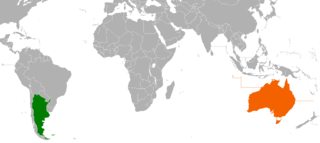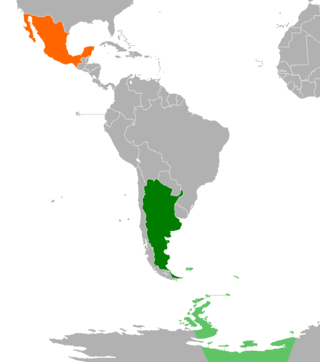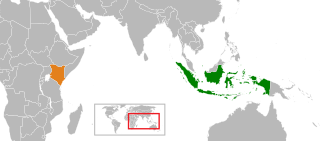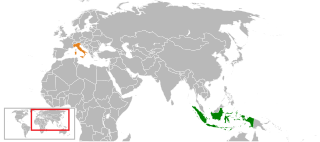
Bilateral relations between the Argentine Republic and Canada have existed for over a century. Both nations are members of the Cairns Group, G20, Organization of American States and the United Nations.

Bilateral relations between Argentina and Australia have existed for years. Both nations are members of the Cairns Group, Forum of East Asia–Latin America Cooperation, G20 and World Trade Organization.

The current and historical relations between the Argentine Republic and the Republic of South Africa, for over a century. Both nations are members of the Cairns Group, G20, Group of 77 and the United Nations.

Diplomatic relations between the Argentine Republic and Ukraine have existed for decades. The importance of relations centers on the history of Ukrainian migration to Argentina. Ukrainians in Argentina form the second largest Ukrainian community in Latin America numbering approximately 250,000 Ukrainians and their descendants.

The Armenian community in Argentina is the largest in Latin America totaling approximately 120,000 members.

Current and historical relations between the Argentine Republic and the Russian Federation have existed for decades. Both nations are members of the G20 and the United Nations.

The nations of Argentina and Mexico established diplomatic relations in 1888. Both nations are members of the Community of Latin American and Caribbean States, G-20 major economies, Latin American Integration Association, Organization of American States, Organization of Ibero-American States and the United Nations.

Diplomatic relations between the Argentine Republic and Hungary have existed for decades. Argentina is host to one of the largest Hungarian communities outside of Hungary. There are approximately 30,000 to 40,000 Argentines of Hungarian descent. Both nations are members of the United Nations.

Diplomatic relations between the Argentine Republic and the Republic of the Philippines, have existed for decades. Both nations are members of the Association of Academies of the Spanish Language, Group of 77, the G20 developing nations, and Forum of East Asia-Latin America Cooperation and the United Nations.

Indonesia and South Korea established diplomatic relations on 18 September 1973. Both countries share a common vision, values and the will to contribute to the international community as middle powers. Both countries are members of G-20 and APEC. South Korea has an embassy in Jakarta and Indonesia has an embassy in Seoul. According to a 2014 BBC World Service Poll, 48% of Indonesians view South Korea's influence positively, with 27% expressing a negative view. The Chinese Indonesian merchant Chen Yanxiang visited Korea between the 1390s and the 1410s, the first major contact between the two nations.

Indonesia and Nigeria established diplomatic relations on 5 March 1965. Both countries are members of multilateral organizations such as the Non-Aligned Movement, World Trade Organization (WTO), Organisation of Islamic Cooperation (OIC) and Developing 8 Countries. Indonesia has an embassy in Abuja and Nigeria has an embassy in Jakarta.

Brazil and Indonesia established diplomatic relations in 1953. Both are large tropical countries endowed with rich natural resources, Brazil and Indonesia possess the largest tropical rain forest of the world that contains the world's richest biodiversity, which gave them a vital role in global environment issues, such as ensuring tropical forests protection. Both countries lead the list of Megadiverse countries with Indonesia second only to Brazil.

The nations of Indonesia and Mexico established diplomatic relations in 1953. Both nations view their counterpart as strategic partners in each other's regions; Indonesia in Southeast Asia and Mexico in Latin America. Both nations are mutual members of the Asia-Pacific Economic Cooperation, Forum of East Asia-Latin America Cooperation, Group of 15, G20, MIKTA, United Nations, and the World Trade Organization.

Indonesia and Kenya established diplomatic relations on 15 October 1979. Indonesia has an embassy in Nairobi, also accredited to the Democratic Republic of the Congo, Somalia, and Uganda. On 18 March 2022, Kenya established its embassy in Jakarta. Both nations are partners in multilateral organizations, such as the World Trade Organization (WTO), Non-Aligned Movement and the Indian Ocean Rim Association.

Indonesia and Italy established diplomatic relations on 29 December 1949. Italy has shown strong desire to improve its relations with Indonesia, especially in intercultural understanding and trade. Indonesia recognizes Italy's strategic location and important role in the middle of Mediterranean region, while Italy has favoured relations with Indonesia, and sees Indonesia as the leader in Southeast Asia. The relations between two countries not only important to bridge the two regional communities; European Union and ASEAN, but also vital as intercultural and interfaith dialog, since Indonesia has the largest Muslim population in the world, and Italy is the heart of the Catholic faith.

Indonesia and Morocco established diplomatic relations in 1960. Both are the Muslim-majority countries; Indonesia is the most populous Muslim country in the world, while Morocco is also a Muslim majority nation. Morocco praised Indonesia as a strong democratic nation, and pointed out that both nations face the same challenges of separatism and terrorism. Diplomatic relations were established in 1960. Indonesia has an embassy in Rabat and a consulate in Casablanca, while Morocco has an embassy in Jakarta. Both nations are members of the World Trade Organization (WTO), Group of 77, Non-Aligned Movement and Organisation of Islamic Cooperation (OIC).

Indonesia and Sweden established diplomatic relations on 23 November 1950. In recent years both nations demonstrate growing keenness to improve bilateral relations, as each head of government exchanged visits. Indonesia has an embassy in Stockholm that also accredited to Latvia, while Sweden has an embassy in Jakarta that also accredited to East Timor.

Ecuador–Indonesia relations refer to bilateral relations between Ecuador and Indonesia. Relations were established on 29 April 1980; however, it was not until November 2004 that Ecuador established its embassy in Jakarta, and reciprocating 6 years later on November 11, 2010, that Indonesia finally opened its embassy in Quito. Both countries are the members of Forum of East Asia-Latin America Cooperation and Non-Aligned Movement.

Foreign relations were officially established on 24 September 1992. Azerbaijan appreciates Indonesia's support in international forums on Azerbaijan's position regarding the Nagorno-Karabakh conflict.

Indonesia–Mongolia relations refer to foreign relations between Indonesia and Mongolia since 1956. Both countries are members of the Asia Cooperation Dialogue, Forum of East Asia-Latin America Cooperation, Non-Aligned Movement, World Trade Organization and the United Nations.
























